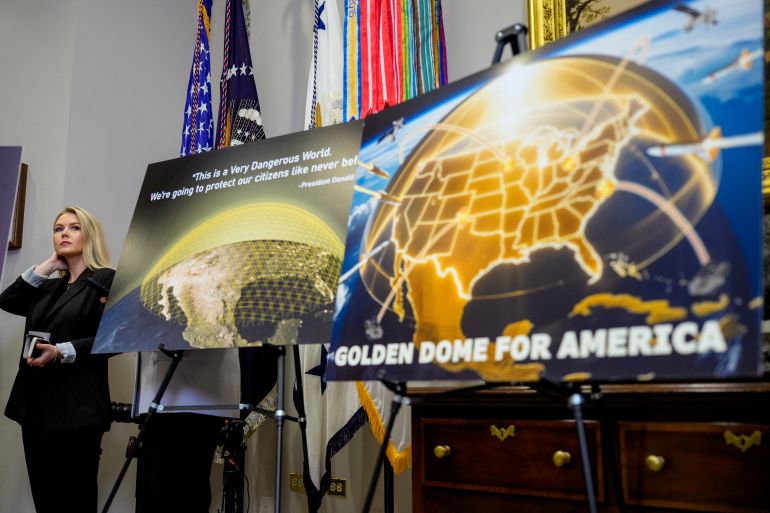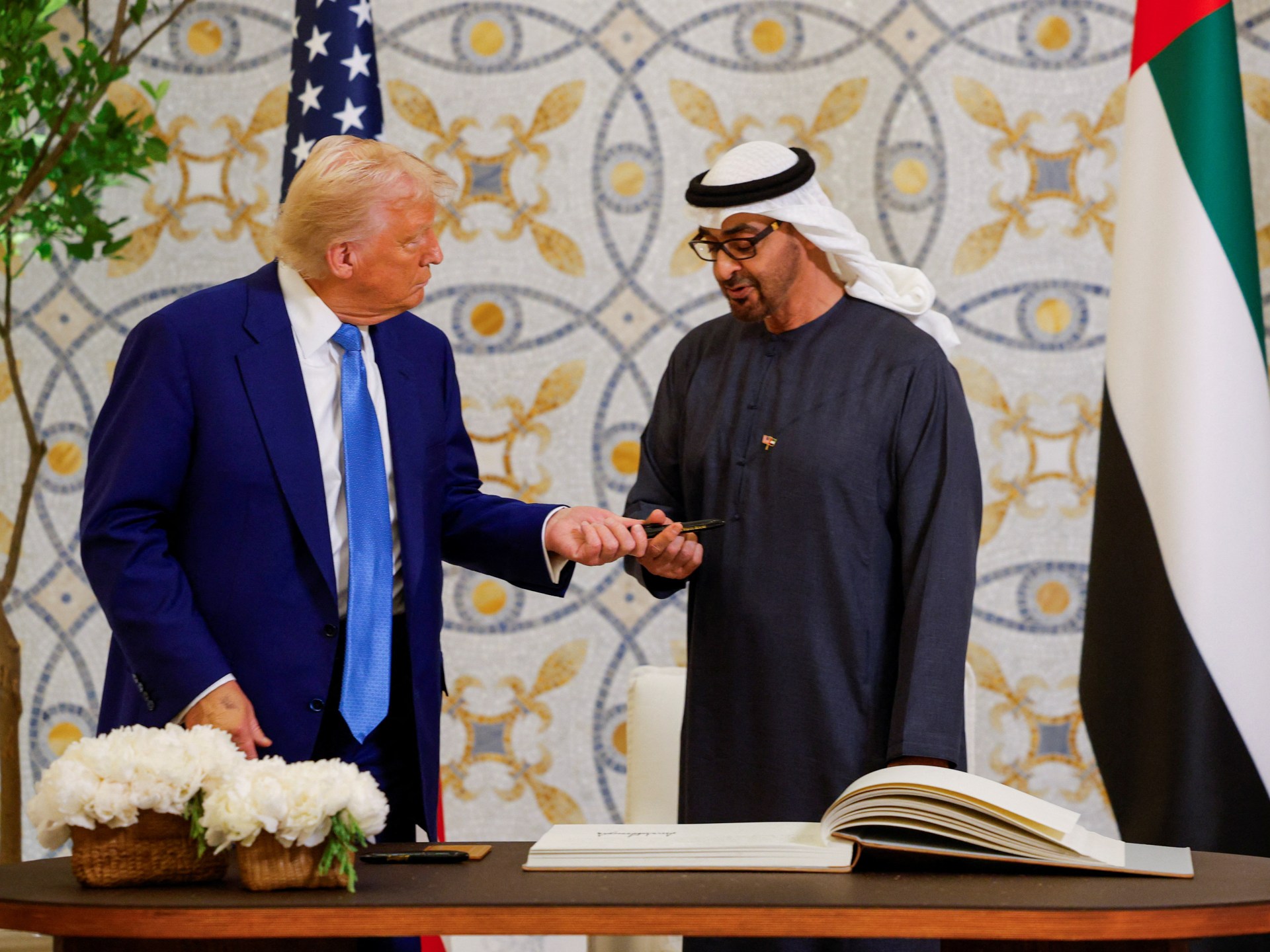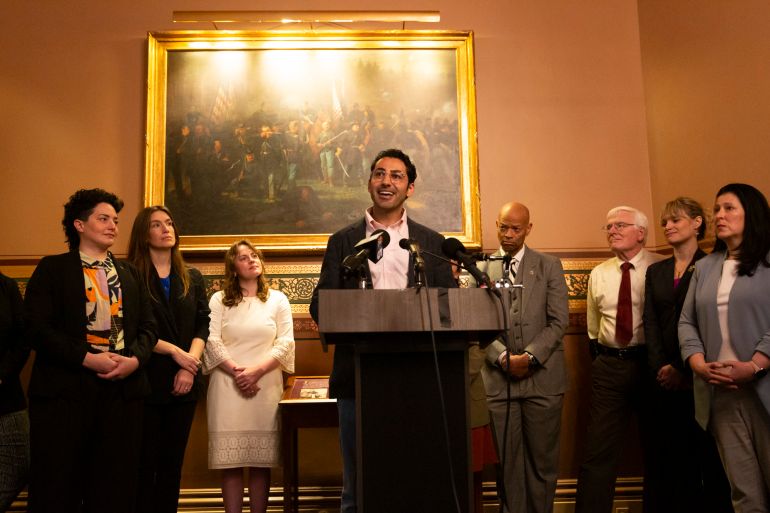Pete Hegseth urges Asia to boost defence against China’s ‘imminent’ threat to Taiwan
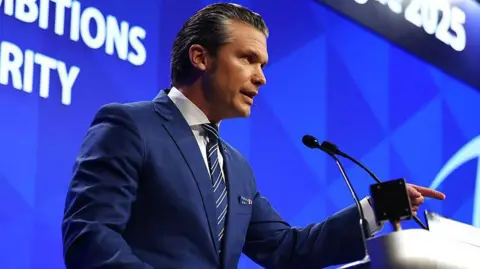 Getty Images
Getty ImagesUS Secretary of Defense Pete Hegseth has warned of China posing an “imminent” threat to Taiwan, while urging Asian countries to boost defence spending and work with the US to deter war.
Hegseth also said that while the US does not “seek to dominate or strangle China”, the US would not be pushed out of Asia and would not allow intimidation of allies.
He was addressing top Asian military officials at the Shangri-la Dialogue, a high-level defence summit held annually in Singapore.
Many in Asia fear potential instability if China invades Taiwan, a self-governing island claimed by Beijing. China has not ruled out the use of force.
In his speech, Hegseth characterised China as seeking to become a “hegemonic power” that “hopes to dominate and control too many parts” of Asia. China has clashed with several neighbours over competing territorial claims in the South China Sea.
He said that Beijing was “credibly preparing to potentially use military force to alter the balance of power” in Asia, and referred to a 2027 deadline that President Xi Jinping has allegedly given for China’s military to be capable to invade Taiwan.
This is a date put forth by US officials and generals for years, but has never been confirmed by Beijing.
China “is building the military needed to do it, training for it, every day and rehearsing for the real deal”, Hegseth said.
“Let me be clear: any attempt by Communist China to conquer Taiwan by force would result in devastating consequences for the Indo-Pacific and the world. There’s no reason to sugarcoat it. The threat China poses is real. And it could be imminent. We hope not but certainly could be.”
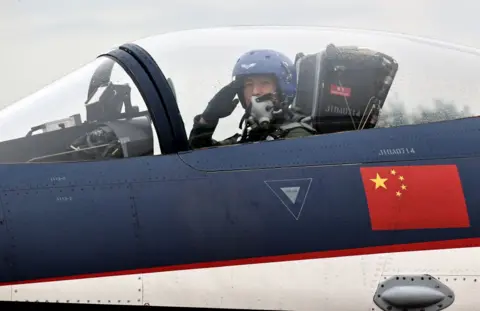 Getty Images
Getty ImagesThe US does not seek war or conflict with China, Hegseth added.
“We do not seek to dominate or strangle China, to encircle or provoke. We do not seek regime change… but we must ensure that China cannot dominate us or our allies and partners,” he said, adding “we will not be pushed out of this critical region.”
Beijing’s lack of response comes amid a deliberately diminished presence at the dialogue.
The event has traditionally served as a platform for the US and China to make their pitches to Asian countries as the superpowers jostle for influence.
But while this year the US has sent one of its largest delegations ever, China instead has sent a notably lower-level team and scrapped its planned speech on Sunday. No explanation has been given for this.
‘Deterrence doesn’t come cheap’
To prevent war, the US wants “a strong shield of deterrence” forged with allies, said Hegseth, who promised the US would “continue to wrap our arms around our friends and find new ways to work together”.
But he stressed that “deterrence does not come cheap” and urged Asian countries to ramp up their defence spending, pointing to Europe as an example.
US President Donald Trump has demanded members of the Western alliance Nato spend more on defence, at least 5% of their GDPs – an approach Hegseth called “tough love, but love nonetheless”. Some countries like Estonia have moved quickly to do so, while others like Germany have signalled an openness to comply.
“How can it make sense for countries in Europe to do that while key allies and partners in Asia spend less in the face of a more formidable threat?” he said with reference to China, adding that North Korea was a threat as well.
“Europe is stepping up. US allies in the Indo-Pacific can, and should, follow by quickly upgrading their own defences,” he insisted, saying they should be “partners, not dependents” on the US.
He touted US military hardware and also pointed to a new Indo-Pacific partnership for defence industrial resilience. Its first projects are establishing a radar repair centre in Australia for US maritime patrol aircraft purchased by allies, and aiding the production of unmanned drones in the region.
He also warned Asian countries against seeking economic ties with China, saying Beijing would use it as “leverage” to deepen their “malign influence”, complicating US defence decisions.
Hegseth’s speech came a day after French President Emmanuel Macron’s pitch at the same dialogue for Europe to be Asia’s ally as well.
Answering a question about Macron’s proposal, he said the US “would much prefer that the overwhelming balance of European investment be on that continent” so that the US could use its “comparative advantage” in the Indo-Pacific.
‘Common sense’ vision
Hegseth also sold Trump’s vision of “common sense” in dealing with the rest of the world, where “America does not have or seek permanent enemies”.
He compared the US President to the late Singaporean statesman Lee Kuan Yew, who was famous for his pragmatic realpolitik in foreign relations.
“The United States is not interested in the moralistic and preachy approach to foreign policy of the past. We are not here to pressure other countries to embrace and adopt policies or ideologies. We are not here to preach to you about climate change or cultural issues. We are not here to impose our will on you,” he said.
It was an approach that Democratic Party Senator Tammy Duckworth, who was part of the US delegation in Singapore, criticised.
Speaking separately to reporters at the dialogue, the member of the Senate’s foreign relations committee said Hegseth and Trump’s vision was “inconsistent with the values on which our nation was founded”.
Others “know what we stand for, we stand for basic human rights, we stand for international law and order. And that’s what we are going to continue to push for. And I know that in the Senate we’re going to try to uphold that or else it would be un-American otherwise,” she said.
Duckworth also took aim at Hegseth’s overall message to allies in the region, calling it “patronising”.
“His idea where we wrap ourselves around you – we don’t need that kind of language. We need to stand with our allies, work together, and send the message that America is not asking people to choose between the PRC (People’s Republic of China) and us.”
Other members of the delegation, Republican representatives Brian Mast and John Moolenaar, told the BBC the speech sent a clear message of China’s threat and it was welcomed by many Asian countries, according to meetings they had with officials.
“The message I’ve heard is that people want to see freedom of navigation and respect for neighbours, but feel intimidated by some of the aggressive actions that China has displayed,” said Moolenaar, who is chairman of a House committee on competition between US and China.
“So the presence of the US is welcome and encouraged. And the message was to continue to be present.”


